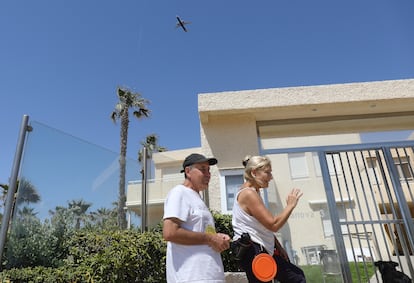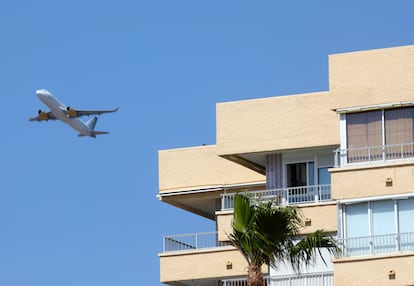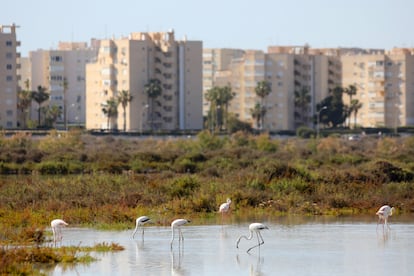One of the Alicante neighborhoods most affected by tourist saturation on the Costa Blanca hardly receives tourist visits. Urbanova, a group of around twenty buildings that add up to 2,000 homes in total, extends five kilometers from the town center in front of a white sand beach without interruption of street or highway. A good part of its 833 registered inhabitants are owners of what they kept as second homes until they retired and moved to live permanently facing the Mediterranean. They walk leisurely, sit on the half-empty terraces of the bars, sunbathe as soon as the weather permits. Not even in summer is it crowded. However, it is difficult to maintain a conversation for more than five minutes at a time. From the Alicante-Elche Miguel Hernández airport, the fifth in Spain in terms of passenger volume and located behind the urbanization, a plane takes off approximately every eight minutes. And they all fly over Urbanova. “If it weren’t for the planes, this would be an idyllic paradise,” says Ascensión Pedrajas, president of the neighborhood association, worried, like everyone, about the “threat” of a second runway being built at the airfield. “With the second clue, our houses would be worth nothing,” she says.

María del Mar and José María, from Madrid and Vigo who prefer not to give their last names, have been in Urbanova for more than 30 years, so they are part of the around 25% of permanent occupancy, even in the low season, in the neighborhood. They have been changing addresses and now live in Las Villas, the area of the neighborhood most affected by aerial noise. “You adapt, but they are still annoying,” they point out. The transfer of planes “previously began at 7 in the morning, but now it has been brought forward to 6,” they say. “Suddenly, seven or eight planes take off in a row and of course, they wake you up.” The flights go in batches throughout the day. “And at night, if you’re watching television, you have to have the remote control nearby, so you can pause or rewind what you’re watching,” because the roar of the engines can overlap a scene crucial to the plot. “We are very concerned about the expansion,” continues the couple of residents, “we see no basis for it when there are already Spanish cities that are fighting against tourist overcrowding.”
María del Mar and José María’s house is a ground floor with a garden. And it is insulated from noise by AENA, like all those that are located under the exit corridor, and depending on how the wind blows, sometimes also from landing, from the planes. According to sources from the public company that manages the airports, the Acoustic Insulation Plan for the Alicante aerodrome has been carried out in 3,247 homes, 1,957 located in the municipality of Elche and 1,290, practically all of them in Urbanova, in Alicante. The total expenditure is 39.75 million euros. “They closed the terraces and installed thicker glass in the windows,” recalls Pedrajas. But the planes pass very close. “A neighbor jokes that she sees what the passengers have for breakfast when the planes land above her home,” the neighborhood president ironically says. And there are more and more. Miguel Hernández does not stop growing, month by month. In the last count, in April, air operations amounted to 10,100, almost 10% more than in the same month of 2023, when there were 9,252.
This incessant increase in travelers has led the municipalities of Alicante and Elche and the Generalitat Valenciana to demand a second runway for the airport. The Minister of Transport and Sustainable Mobility, Óscar Puente, stated in a recent visit to Alicante that he rejects the expansion, among other things, “because the airlines do not see it necessary.” Lorenzo Gómez, a resident of Albacete who has owned an apartment for 30 years, clings to that statement and took advantage of the Corpus Christi weekend this week to spend a few days in Urbanova. “In my house it’s not so noticeable,” he concedes, “but in the restaurants, on the promenade and in these blocks,” he says, pointing to Las Villas, “it’s unbearable.” The conversation fragments between takeoffs. “The planes fly over the houses, when they should use an aerial corridor” supposedly located to the south, where the buildings end, above a nudist beach. Without flights, “this would be extraordinary, we have a supermarket, terraces, an outpatient service in summer and everything necessary in El Altet”, an Elche district located a kilometer and a half walk away. “Of course, there is no ATM, no tobacco shop, nor can you take the lottery ticket,” says Gómez. In a nearby bar, an employee also points out that the airport jammers make telecommunications difficult. “Sometimes not even the dataphone works for card payments,” he asserts.

What a
ffects the most is what happens closest. So you don’t miss anything, subscribe.
Subscribe
“And your own vehicle is almost essential,” says Pedrajas. In addition to the engine scandal, he emphasizes that Urbanova suffers from three serious problems, in his opinion. “We can’t go downtown except by car or bus,” he says. And public transport “in winter, leaves with a frequency of one every hour or hour and ten minutes.” Something that would be solved “if the C6, the airport bus, which leaves Alicante every 20 minutes, passed through here before arriving at El Altet and heading towards the terminal.” An itinerary that was tried and rejected years ago. “We also do not need the walk to Arenales beach” announced by Elche and Alicante this month, “but rather the one that would unite us with Alicante.” And, finally, “the Ministry of Health should install a fixed outpatient clinic because we only have a daily doctor from June to September.”
Urbanova was built in 1972. It is not going to grow, because it is surrounded by land by the Saladar de Agua Amarga, a protected wetland, and by sea, by the Site of Community Interest (SCI) of the island of Tabarca, an untouchable maritime reserve. with Posidonia meadows. But the salt marsh “is in a deplorable state,” denounces Sergio Arroyo, president of the environmental association Friends of the Southern Alicante Wetlands (AHSA). “It is a natural space abandoned by the administrations,” precisely, “because no one wants a protected area that would hinder a second runway” at the airport, he suspects. “AENA does not want a repeat of El Prat”, whose expansion was paralyzed because it affected a wetland in the Llobregat delta.

Subscribe to continue reading
Read without limits
_
#Urbanova #Alicante #neighborhood #difficult #talk #minutes #row